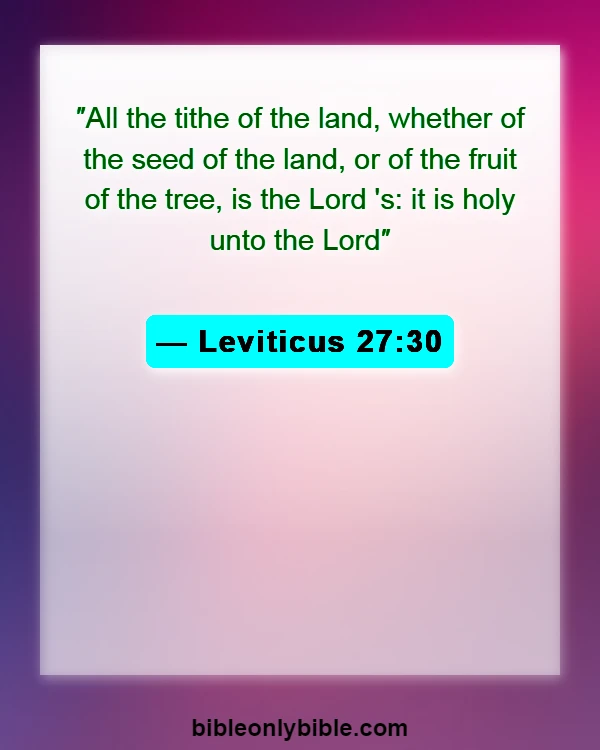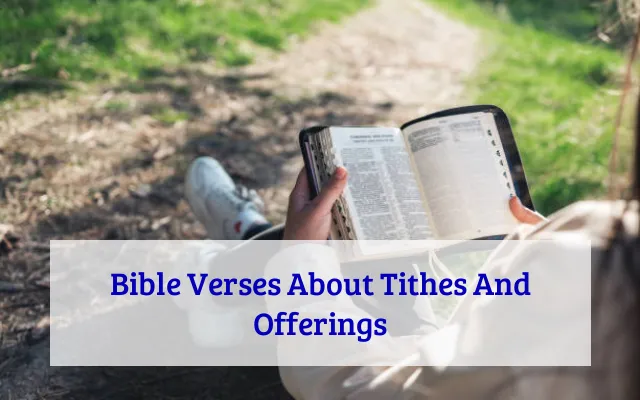Friends, if you’re searching for “Bible Verses About Tithes And Offerings,” this content is for you. Today, I share Bible verses that will help you better understand tithing and giving according to the Bible. These scriptures offer guidance on generosity, stewardship, and the spiritual significance of financial offerings. Whether you’re new to the concept or seeking to deepen your understanding, these verses will provide valuable insights into God’s perspective on tithes and offerings as outlined in His Word.
Contents
- 1 What Does the Bible Say About Tithing 10 Percent?
- 1.1 Leviticus 27:30 – A tenth of produce is the Lord’s holy tithe
- 1.2 Malachi 3:10 – Test God by tithing; blessings will overflow
- 1.3 Deuteronomy 14:22 – Tithe a tenth of your produce annually
- 1.4 Numbers 18:26 – Levites’ tithe from Israelites’ offerings to God
- 1.5 2 Chronicles 31:5 – Generous tithes support temple work and priests
- 2 Old Testament Verses on Tithes and Offerings
- 2.1 Genesis 14:20 – Abram gives Melchizedek a tenth of everything
- 2.2 Numbers 18:21 – Tithes given to Levites for their service
- 2.3 Deuteronomy 12:6 – Bring offerings, tithes, and sacrifices to God’s dwelling
- 2.4 2 Chronicles 31:12 – Heaps of tithes stored in God’s temple
- 2.5 Nehemiah 10:37 – Offerings of firstfruits and tithes to God’s house
- 2.6 Nehemiah 12:44 – People appointed to oversee tithes and offerings
- 2.7 Malachi 3:8 – Robbing God through withheld tithes and offerings
- 3 New Testament Teachings About Giving and Offerings
- 3.1 Matthew 6:21 – Heart’s treasure reveals true value and priorities
- 3.2 Luke 6:38 – Generosity returns abundantly, measured by your giving
- 3.3 2 Corinthians 9:7 – Give cheerfully, not reluctantly, as God loves a cheerful giver
- 3.4 Acts 20:35 – It is more blessed to give than to receive
- 3.5 1 Corinthians 16:2 – Set aside funds weekly for collection
- 4 The Difference Between Tithes and Offerings in Scripture
- 5 Biblical Promises for Those Who Give Tithes
- 6 How to Give According to Biblical Principles
- 7 What Happens When You Don’t Tithe According to the Bible?
- 7.1 Malachi 3:8-9 – Withholding tithes brings a curse
- 7.2 Haggai 1:6 – Lack and dissatisfaction from neglecting God’s priorities
- 7.3 Proverbs 11:24 – Generosity leads to abundance, withholding leads to poverty
- 7.4 Matthew 23:23 – Justice, mercy, and faithfulness over rigid tithing
- 7.5 Luke 12:33 – Store treasures in heaven, not earthly wealth
- 8 Modern Application of Biblical Tithing and Giving
What Does the Bible Say About Tithing 10 Percent?
Tithing is an ancient practice of giving back to God a portion of what He has provided. It’s a tangible way to express gratitude and trust in God’s provision. Although the amount of 10 percent is often mentioned, the heart behind the giving is what truly matters. It’s not just a duty but an act of worship and faith.
Leviticus 27:30 – A tenth of produce is the Lord’s holy tithe

All the tithe of the land, whether of the seed of the land, or of the fruit of the tree, is the Lord ‘s: it is holy unto the Lord
Leviticus 27:30
Explanation:- This verse highlights the principle of dedicating a tenth of one’s produce to God, underscoring the concept of tithing as an act of worship and recognition of God’s provision. It emphasizes the holiness of the tithe, acknowledging that all we have ultimately belongs to God.
Malachi 3:10 – Test God by tithing; blessings will overflow

Bring ye all the tithes into the storehouse, that there may be meat in mine house, prove me now herewith, saith the Lord of hosts, if I will not open you the windows of heaven, pour you out a blessing, that there shall not be room enough to receive it
Malachi 3:10
Explanation:- This verse encourages believers to bring their full tithe to God’s storehouse, promising that by doing so, God will open the floodgates of heaven and pour out abundant blessings. It emphasizes the principle of trusting God through giving and experiencing His generous provision.
Deuteronomy 14:22 – Tithe a tenth of your produce annually
Thou shalt truly tithe all the increase of thy seed, that the field bringeth forth year by year
Deuteronomy 14:22
Explanation:- This verse instructs the Israelites to set aside a tenth of their produce each year as a tithe. This practice emphasizes gratitude, obedience, and the acknowledgment of God’s provision, serving as a reminder to honor God with the firstfruits of one’s labor.
Numbers 18:26 – Levites’ tithe from Israelites’ offerings to God
Thus speak unto the Levites, say unto them, When ye take of the children of Israel the tithes which I have given you from them for your inheritance, then ye shall offer up an heave offering of it for the Lord , even a tenth part of the tithe
Numbers 18:26
Explanation:- In this verse, God instructs the Levites to receive tithes from the Israelites as their inheritance. The Levites are then required to offer a tenth of these tithes to the Lord, acknowledging that all provisions ultimately belong to Him.
2 Chronicles 31:5 – Generous tithes support temple work and priests
As soon as the commandment came abroad, the children of Israel brought in abundance the firstfruits of corn, wine, oil, honey, of all the increase of the field; the tithe of all things brought they in abundantly
2 Chronicles 31:5
Explanation:- This verse highlights the Israelites’ generous contributions to support temple work and the priests. As soon as they began giving, they brought abundant firstfruits and tithes of their produce, demonstrating their commitment to God’s command and the community’s spiritual and practical needs.
Old Testament Verses on Tithes and Offerings
The Old Testament lays the foundation for the practice of tithes and offerings, showing us how giving was an integral part of worship. It was a way for the community to support the temple, priests, and those in need. These acts were expressions of obedience and reverence to God, ensuring that His work continued faithfully.
Genesis 14:20 – Abram gives Melchizedek a tenth of everything
Blessed be the most high God, which hath delivered thine enemies into thy hand. he gave him tithes of all
Genesis 14:20
Explanation:- In this verse, Abram acknowledges God’s blessing by giving Melchizedek, the priest-king of Salem, a tenth of his possessions. This act of tithing, a form of worship and gratitude, sets a precedent for acknowledging divine provision and support in the Old Testament.
Numbers 18:21 – Tithes given to Levites for their service
Behold, I have given the children of Levi all the tenth in Israel for an inheritance, for their service which they serve, even the service of the tabernacle of the congregation
Numbers 18:21
Explanation:- This verse highlights the allocation of tithes to the Levites as a reward for their dedicated service in the tent of meeting. It underscores the principle of supporting religious leaders and workers through offerings, ensuring they are provided for while serving the community.
Deuteronomy 12:6 – Bring offerings, tithes, and sacrifices to God’s dwelling
Thither ye shall bring your burnt offerings, your sacrifices, your tithes, heave offerings of your hand, your vows, your freewill offerings, the firstlings of your herds of your flocks
Deuteronomy 12:6
Explanation:- This verse highlights the importance of bringing tithes, offerings, and sacrifices to the place God has chosen for worship. It underscores the act of giving as an essential part of honoring and obeying God, fostering a sense of community and devotion among believers.
2 Chronicles 31:12 – Heaps of tithes stored in God’s temple
Brought in the offerings the tithes the dedicated things faithfully: over which Cononiah the Levite was ruler, Shimei his brother was the next
2 Chronicles 31:12
Explanation:- In this verse, the Israelites faithfully brought their tithes and offerings to the temple, resulting in abundant heaps of provisions. This demonstrates their commitment to God’s commandments and highlights the importance of supporting religious institutions through generous giving.
Nehemiah 10:37 – Offerings of firstfruits and tithes to God’s house
That we should bring the firstfruits of our dough, our offerings, the fruit of all manner of trees, of wine of oil, unto the priests, to the chambers of the house of our God; the tithes of our ground unto the Levites, that the same Levites might have the tithes in all the cities of our tillage
Nehemiah 10:37
Explanation:- In this verse, the Israelites commit to bringing the firstfruits and tithes to the temple, ensuring the priests and Levites are supported. It underscores the importance of providing for God’s house and honoring Him with the first portion of their harvest.
Nehemiah 12:44 – People appointed to oversee tithes and offerings
At that time were some appointed over the chambers for the treasures, for the offerings, for the firstfruits, for the tithes, to gather into them out of the fields of the cities the portions of the law for the priests Levites: for Judah rejoiced for the priests for the Levites that waited
Nehemiah 12:44
Explanation:- This verse highlights the organization and management of tithes and offerings in ancient Israel. It underscores the importance of accountability and stewardship in handling resources dedicated to God, reflecting a communal commitment to worship and support for the temple and its services.
Malachi 3:8 – Robbing God through withheld tithes and offerings
Will a man rob God? Yet ye have robbed me. But ye say, Wherein have we robbed thee? In tithes offerings
Malachi 3:8
Explanation:- This verse addresses the issue of withholding tithes and offerings, highlighting it as a form of robbing God. It calls for faithful giving as a demonstration of trust and obedience, emphasizing the importance of honoring God through generous stewardship.
New Testament Teachings About Giving and Offerings
In the New Testament, the focus shifts to the heart and spirit of giving rather than specific amounts. Jesus and the apostles teach us to give cheerfully and generously, reflecting the grace we’ve received. Giving becomes a way to build community, support ministry, and show love to others, emphasizing willingness over obligation.
Matthew 6:21 – Heart’s treasure reveals true value and priorities

For where your treasure is, there will your heart be also
Matthew 6:21
Explanation:- This verse teaches that what we treasure most reveals our true values and priorities. In the context of tithes and offerings, it encourages us to reflect on where our financial commitments lie, emphasizing that our giving should align with our spiritual values and devotion.
Luke 6:38 – Generosity returns abundantly, measured by your giving

Give, it shall be given unto you; good measure, pressed down, shaken together, running over, shall men give into your bosom. For with the same measure that ye mete withal it shall be measured to you again
Luke 6:38
Explanation:- Generosity leads to abundant blessings, as giving to others invites similar generosity in return. The measure of your giving determines the measure of what you receive, encouraging a heart open to sharing and kindness. This reflects New Testament teachings on offerings and giving.
2 Corinthians 9:7 – Give cheerfully, not reluctantly, as God loves a cheerful giver

Every man according as he purposeth in his heart, so let him give; not grudgingly, or of necessity: for God loveth a cheerful giver
2 Corinthians 9:7
Explanation:- This verse encourages believers to give willingly and joyfully, rather than out of obligation or reluctance. It underscores the importance of a positive attitude in giving, highlighting that God values the heart behind the gift more than the gift itself.
Acts 20:35 – It is more blessed to give than to receive

I have shewed you all things, how that so labouring ye ought to support the weak, to remember the words of the Lord Jesus, how he said, It is more blessed to give than to receive
Acts 20:35
Explanation:- This verse highlights the virtue of generosity, encouraging believers to focus on giving rather than receiving. It underscores the joy and blessings that come from selfless acts of kindness, aligning with New Testament teachings that emphasize love, community support, and sacrificial giving.
1 Corinthians 16:2 – Set aside funds weekly for collection

Upon the first day of the week let every one of you lay by him in store, as God hath prospered him, that there be no gatherings when I come
1 Corinthians 16:2
Explanation:- This verse encourages believers to regularly set aside funds for collection, promoting consistent and thoughtful giving. It highlights the importance of planning and generosity in supporting the community, reflecting New Testament principles on tithes and offerings.
The Difference Between Tithes and Offerings in Scripture
While tithes are a designated portion, typically a tenth, offerings are gifts given above and beyond the tithe. They represent freewill expressions of gratitude and generosity. Scripture distinguishes between these two forms of giving, each playing a unique role in worship and community support, allowing us to demonstrate our love for God and others.
Leviticus 27:32 – Every tenth animal belongs to the Lord
Concerning the tithe of the herd, or of the flock, even of whatsoever passeth under the rod, the tenth shall be holy unto the Lord
Leviticus 27:32
Explanation:- This verse highlights the practice of tithing, where every tenth animal is set apart for God, signifying dedication and obedience. Tithes are distinct from offerings, which are voluntary gifts. This distinction underscores intentional giving and emphasizes gratitude and stewardship in faith.
Deuteronomy 12:17 – Tithes consumed in designated place, not personal use
Thou mayest not eat within thy gates the tithe of thy corn, or of thy wine, or of thy oil, or the firstlings of thy herds or of thy flock, nor any of thy vows which thou vowest, nor thy freewill offerings, or heave offering of thine hand
Deuteronomy 12:17
Explanation:- This verse highlights that tithes and offerings are to be consumed in a designated place, emphasizing their sacred nature. It distinguishes between personal use and the communal or religious purpose of tithes, ensuring they honor God’s commands and support the community.
Proverbs 3:9 – Honor God with wealth and firstfruits

Honour the Lord with thy substance, with the firstfruits of all thine increase
Proverbs 3:9
Explanation:- Proverbs 3:9 encourages honoring God with your wealth and the first of your produce, highlighting the importance of prioritizing God in your financial and material blessings. This verse underscores the concept of tithes as a duty and offerings as expressions of gratitude.
Biblical Promises for Those Who Give Tithes
The Bible assures us that God honors the faithfulness of those who give. Promises of blessing and provision are linked to our willingness to trust God with our resources. By tithing, we are invited to witness God’s faithfulness and abundance in our lives, creating a cycle of giving and receiving that strengthens our faith.
Proverbs 3:9-10 – Honor God, abundance follows giving

Honour the Lord with thy substance, with the firstfruits of all thine increaseSo shall thy barns be filled with plenty, thy presses shall burst out with new wine
Proverbs 3:9-10
Explanation:- Proverbs 3:9-10 highlights the importance of honoring God with our wealth. By giving tithes and offerings, we acknowledge His provision. In return, we are promised abundance and blessings, reinforcing the biblical principle that generous giving leads to divine favor and prosperity.
2 Corinthians 9:6 – Generosity yields abundant blessings

But this I say, He which soweth sparingly shall reap also sparingly; he which soweth bountifully shall reap also bountifully
2 Corinthians 9:6
Explanation:- Generosity leads to abundant blessings. This verse highlights the principle that those who give generously will also receive generously. It encourages believers to trust in God’s provision and promises, underscoring the spiritual and material rewards of cheerful giving.
Philippians 4:19 – God provides abundantly for all needs

But my God shall supply all your need according to his riches in glory by Christ Jesus
Philippians 4:19
Explanation:- This verse assures believers that God will meet all their needs through His abundant riches. It highlights the promise of divine provision for those who give faithfully, encouraging trust in God’s generosity and faithfulness as a response to their tithes and offerings.
How to Give According to Biblical Principles
Giving according to biblical principles involves more than just the act itself; it’s about the attitude of our hearts. The Bible encourages us to give generously, cheerfully, and with love. By giving in this way, we align our hearts with God’s purposes, allowing our resources to be used for His glory and the blessing of others.
Matthew 6:3-4 – Give in secret; God rewards openly
But when thou doest alms, let not thy left hand know what thy right hand doethThat thine alms may be in secret: thy Father which seeth in secret himself shall reward thee openly
Matthew 6:3-4
Explanation:- This passage teaches the importance of giving quietly and humbly, without seeking attention or praise from others. By doing so, we align with biblical principles of generosity, trusting that God sees our sincere acts of kindness and will reward us openly in His time.
Luke 21:1-4 – Widow’s humble offering valued above all others
He looked up, saw the rich men casting their gifts into the treasuryAnd he saw also a certain poor widow casting in thither two mitesAnd he said, Of a truth I say unto you, that this poor widow hath cast in more than they allFor all these have of their abundance cast in unto the offerings of God: but she of her penury hath cast in all the living that she had
Luke 21:1-4
Explanation:- In this passage, Jesus observes a poor widow giving two small coins, emphasizing that her humble offering is more significant than larger gifts from the wealthy. This teaches that God values the heart and sacrifice behind the gift, not the amount.

That they do good, that they be rich in good works, ready to distribute, willing to communicate
1 Timothy 6:18
Explanation:- This verse encourages believers to be generous and willing to share, emphasizing the importance of doing good deeds. It aligns with biblical principles of giving, highlighting that true generosity is about helping others and being rich in good works, rather than just material wealth.
What Happens When You Don’t Tithe According to the Bible?
Choosing not to tithe can reflect a lack of trust in God’s provision. The Bible warns of the spiritual consequences of withholding what belongs to God, which can hinder our relationship with Him. However, it’s never too late to start giving and experience the joy and blessings that come from living generously.
Malachi 3:8-9 – Withholding tithes brings a curse
Will a man rob God? Yet ye have robbed me. But ye say, Wherein have we robbed thee? In tithes offeringsYe are cursed with a curse: for ye have robbed me, even this whole nation
Malachi 3:8-9
Explanation:- Withholding tithes leads to being under a curse, as it is seen as robbing God. This verse highlights the importance of faithfully giving tithes and offerings, which are considered a divine obligation, to align with God’s will and receive His blessings.
Haggai 1:6 – Lack and dissatisfaction from neglecting God’s priorities
Ye have sown much, bring in little; ye eat, but ye have not enough; ye drink, but ye are not filled with drink; ye clothe you, but there is none warm; he that earneth wages earneth wages to put it into a bag with holes
Haggai 1:6
Explanation:- This verse highlights the consequences of neglecting God’s priorities, such as tithing. It illustrates how withholding what belongs to God leads to lack and dissatisfaction, as efforts seem unfruitful. The message encourages prioritizing God to experience true fulfillment and provision.
Proverbs 11:24 – Generosity leads to abundance, withholding leads to poverty

There is that scattereth, yet increaseth; there is that withholdeth more than is meet, but it tendeth to poverty
Proverbs 11:24
Explanation:- Generosity fosters abundance, while withholding can result in lack. This verse highlights the spiritual principle of giving, suggesting that when we freely offer tithes and offerings, we invite blessings, whereas holding back can lead to spiritual and material poverty.
Matthew 23:23 – Justice, mercy, and faithfulness over rigid tithing

Woe unto you, scribes Pharisees, hypocrites! for ye pay tithe of mint anise cummin, have omitted the weightier matters of the law, judgment, mercy, faith: these ought ye to have done, not to leave the other undone
Matthew 23:23
Explanation:- This verse highlights the importance of prioritizing justice, mercy, and faithfulness over rigid adherence to tithing. While tithing is important, it should not overshadow the greater moral and ethical responsibilities that reflect a true commitment to God’s teachings.
Luke 12:33 – Store treasures in heaven, not earthly wealth

Sell that ye have, give alms; provide yourselves bags which wax not old, a treasure in the heavens that faileth not, where no thief approacheth, neither moth corrupteth
Luke 12:33
Explanation:- This verse encourages believers to focus on spiritual wealth rather than material possessions. By giving generously and prioritizing heavenly treasures, individuals align with God’s values, experiencing true security and fulfillment. Neglecting this principle may lead to spiritual impoverishment and missed blessings.
Modern Application of Biblical Tithing and Giving
In today’s world, the principles of tithing and giving remain relevant. While the form may vary, the heart of giving is timeless. We are called to be stewards of what God has entrusted to us, using our resources to support our communities, churches, and those in need, reflecting Christ’s love in practical and impactful ways.
1 Timothy 6:17-19 – Be generous and store heavenly treasures
Charge them that are rich in this world, that they be not highminded, nor trust in uncertain riches, but in the living God, who giveth us richly all things to enjoyThat they do good, that they be rich in good works, ready to distribute, willing to communicateLaying up in store for themselves a good foundation against the time to come, that they may lay hold on eternal life
1 Timothy 6:17-19
Explanation:- This passage encourages the wealthy to be humble, place their trust in God rather than riches, and to be generous and willing to share. By doing so, they build a foundation for eternal life, aligning with the principles of tithing and offering.

Distributing to the necessity of saints; given to hospitality
Romans 12:13
Explanation:- This verse encourages believers to support those in need and to extend kindness to others. It underscores the importance of generosity and hospitality, aligning with the principles of tithing and offerings by fostering a spirit of giving and community care.

But to do good to communicate forget not: for with such sacrifices God is well pleased
Hebrews 13:16
Explanation:- This verse encourages believers to engage in acts of goodness and generosity, highlighting that such actions are pleasing to God. It underscores the importance of sharing resources and doing good as a modern reflection of biblical principles on tithing and offerings.
James 1:27 – Pure religion: care for orphans and widows

Pure religion undefiled before God the Father is this, To visit the fatherless widows in their affliction, to keep himself unspotted from the world
James 1:27
Explanation:- This verse highlights the essence of true faith through compassionate actions. It urges believers to support those in need, such as orphans and widows, reflecting true devotion. In modern contexts, this principle extends to tithing and offerings, encouraging generosity and care for the vulnerable.
Matthew 6:19-21 – Store treasures in heaven, not on earth

Lay not up for yourselves treasures upon earth, where moth rust doth corrupt, where thieves break through stealBut lay up for yourselves treasures in heaven, where neither moth nor rust doth corrupt, where thieves do not break through nor stealFor where your treasure is, there will your heart be also
Matthew 6:19-21
Explanation:- This passage encourages prioritizing spiritual wealth over material possessions. In the context of tithing and giving, it reminds us to focus on acts of generosity that have eternal significance, aligning our hearts with heavenly values rather than earthly accumulation.
